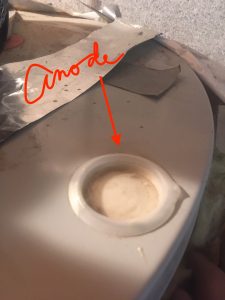Save money on energy bills and extend the life of your hot water tank with these tips and tricks!
The first thing you can do to save on energy bills is to insulate your hot water tank. Insulation is easy to add and increases the thermal capacity of the tank, preventing heat loss.
Fully emptying and refilling the tank annually is a great way to increase the longevity of your tank, especially if you have hard water. The purpose of draining the hot water tank is to remove any sediment that may have built up. This sediment can come from the water supply or from the tank itself. If your anode rod is already corroded then the tank lining will start to corrode into your hot water (more about this later).
If you hear the sound of percolation in your tank, then you may need to drain it more often. This sound is steam bubbling up through sediment at the bottom of your tank.
Accumulated sediment creates a thermal barrier. As your water heats up, sediment can create hot spots along the inner wall of the water jacket, spots that will corrode faster. In an electric water heater, this thermal layer will make the lower heat coil work too hard and will cause it to wear out quicker.
Tools needed:
- Screwdriver (flat blade)
- Adjustable crescent wrench or pliers
Steps prior to draining the tank:
- Ensure a drain hose is attached to the flush valve and that the draining end is lower than the valve so no backflow occurs.
- Shut off cold water supply feeding the hot water tank.
- Shut off the power.
- Gas-fired: turn off the gas supply
- Electric: disconnect power at the breaker or unplug
- Relieve backpressure by opening a hot water valve anywhere in the house (prevent airlock).
Check out the video above for instructions on locating your valve and draining the water tank.
Once tank draining is finished:
- Close your valve completely
- Turn the water supply on
- Once the tank is full, restore power (make sure it’s finished filling first)
- You will probably have air in your hot water lines for a short time – do not be alarmed!

Note about anode rods: If you have a rotten egg smell only in your hot water, then most likely the anode rod in your hot water tank is bad. Your anode rod is made of magnesium, zinc or aluminum; material that corrodes faster than your water tank and prevents tank decay. If you have hard water, then aluminum anode rods are best. These rods last around two years. They are referred to as the “sacrificial lamb” of the water heaters. It is easy to locate your anode rod (see photo), but it is not easy to replace it and you may want to call in a professional.
- Keith water heaters and parts: https://keithspecialty.com/water.heaters_parts.htm
- More on hot water tank maintenance:
https://www.thisoldhouse.com/plumbing/21016402/how-to-maintain-a-water-heater

